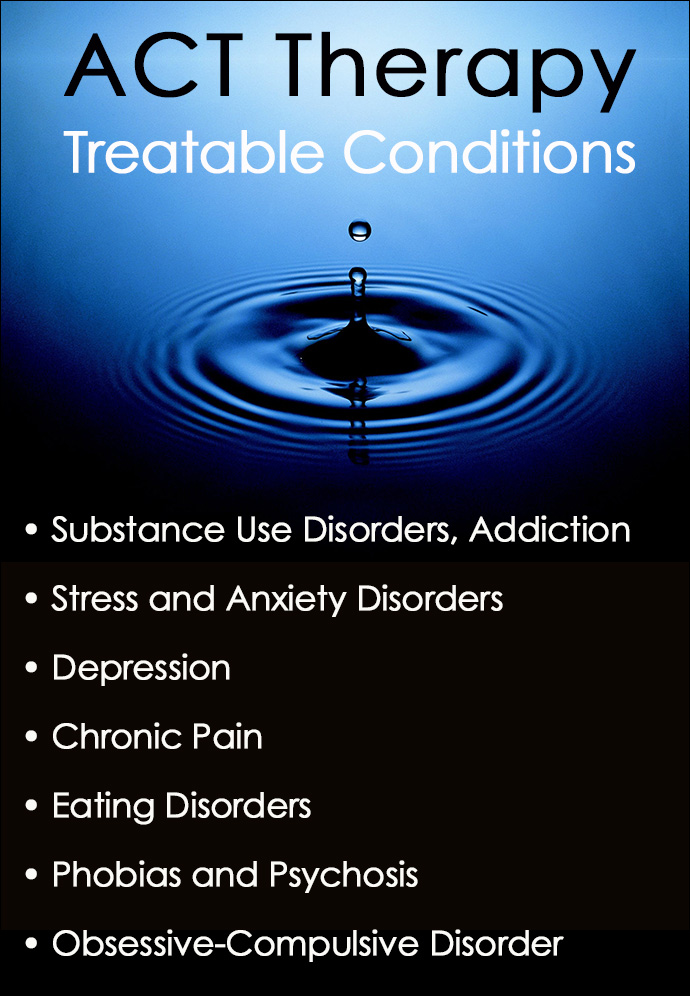Table of Contents
Acceptance and Commitment Therapy, also known as ACT Therapy, is a unique and effective therapeutic approach for many types of physical and mental health conditions, including addiction.
ACT is unique in part because, rather than attempting to reduce the symptoms of the conditions being treated like traditional therapies, it still offers positive results.
It has shown to be an effective form of individual therapy, and also works well for couples and in a group therapy setting.
What is Acceptance and Commitment Therapy?
At its core, Acceptance and Commitment Therapy is a form of mindfulness behavioral therapy that adheres to the belief that it’s counterproductive to try to control or change painful emotions or experiences because this will only lead to more suffering and distress.
ACT therapy suggests alternatives to changing the way a person thinks by using six core processes that focus on mindfulness, attention to values, and a commitment to action.
People utilizing ACT therapy learn ways to stop struggling, denying, or avoiding painful emotions.
With practice, individuals will come to accept that the feelings causing stress, anxiety, or some types of depression are appropriate reactions to often deeply traumatic experiences, and that these feelings should not stop them from moving on with their life.
Some people have called ACT therapy a “third wave” psychotherapy, along with similar treatment modalities like Dialectical Behavioral Therapy (DBT) and Mindfulness-based Cognitive Therapy (MBCT).
History and Effectiveness of Acceptance and Commitment Therapy
Acceptance and Commitment Therapy is an action-oriented form of intervention that was developed in the 1980s by psychologist Steven C. Hayes, a professor at the University of Nevada.
The therapeutic ideas that eventually became ACT were created in response to his own mental health struggles and his decision that in order to heal, he must accept himself and his experiences instead of trying to avoid them.
The first study on the effectiveness of ACT was published in 1986, and as of 2006, only about 30 clinical trials had been conducted.
By 2019, the number of randomized-controlled trials (RCTs) had increased to more than 325.
A year later, an examination of 20 meta-analyses found that Acceptance and Commitment Therapy was an effective therapeutic approach for depression, anxiety, addiction, and pain, and offered results similar to other treatments such as cognitive behavioral therapy (CBT).
What Conditions Does ACT Therapy Treat?
ACT therapy is very flexible and can be applied to many different mental health issues, with some research showing it can also benefit those suffering from more than one mental health issue at a time.
Some of the conditions that mental health professionals use ACT Therapy for include:
- Substance Use Disorders and Addiction
- Stress and Anxiety Disorders
- Depression
- Chronic Pain
- Eating Disorders
- Phobias and Psychosis
- Obsessive-Compulsive Disorder
Acceptance and Commitment Therapy can be particularly useful for treating co-occurring disorders, which is the combination of a substance use addiction and a mental health issue, such as depression or PTSD.
Dual diagnosis treatment is important because it treats the issues of both addiction and mental health at the same time. If only one condition is addressed during treatment, the other one will remain and recovery will not be successful.
6 Core Processes of Acceptance and Commitment Therapy
Acceptance and Commitment Therapy is organized into six distinct processes that people will learn about during therapy sessions.
The 6 core processes of ACT Therapy include:
1. Acceptance
Acceptance is the first principle that aims to acknowledge and accept painful thoughts and emotions rather than struggling, denying, or trying to change them.
2. Cognitive Defusion
Cognitive Defusion is a core principle of ACT Therapy with the objective of learning to change the way we react to troubling or painful thoughts and emotions.
Techniques like observing thoughts or feelings without judgment, singing the thought you have out loud, or labeling the response to negative thoughts can provide distance and defuse the emotion.
3. Being Present
Observing our thoughts and feelings without judgment or trying to change them is often referred as being mindful in the present moment.
When we clearly observe our thoughts and feelings without criticizing ourselves for experiencing them, it helps to promote behavior changes as well as accepting them.
4. Self as Context
Learning to develop and embrace identity can be difficult, but ACT Therapy works to teach people that they are more than just their experiences, feelings, and thoughts.
Understanding this concept helps people avoid acting out in response to painful thoughts and emotions.
5. Values
Identifying what is important to us is vital. This can include serving our family, our community, or any number of things that make us feel a greater sense of purpose.
Once we identify our values, ACT therapy works to help people live according to those principles despite what others might think.
6. Committed Action
At this point in ACT therapy, people take solid steps toward behavioral changes that line up with their values and a more positive lifestyle, perspective, and attitude.
Committed action can include setting goals and learning new skills to make necessary healthy changes.
Acceptance and Commitment Therapy Exercises
An individual or group will work with a trained therapist to use exercises and techniques related to the six core principles of ACT therapy outlined above.
The exercises provide a way for clients to better understand acceptance, learn mindfulness skills, and the core process to improve flexible thinking.
Many of the exercises are useful metaphors that make them easy to relate to for most people.
Common ACT Therapy exercises include:
- Radio Doom and Gloom
- Carry It With You
- The Struggle Switch
- Simple Centering
- Anchor Breathing
- Sing It
- Riding the Storm Out
- Loving-Kindness Meditation
The exercises learned in therapy can be useful for a long-term recovery because they can be used at any time.
Many traditional therapies work to reduce the symptoms of the conditions being treated by changing behavior.
Acceptance and Commitment Therapy uses a different approach to accept and defuse painful thoughts and trauma to create a richer and more meaningful life.
When used together with other interventions, ACT provides a powerful way of healing with lasting results. Because of this, it is becoming an important non 12-step treatment therapy for mental health and addiction recovery.






